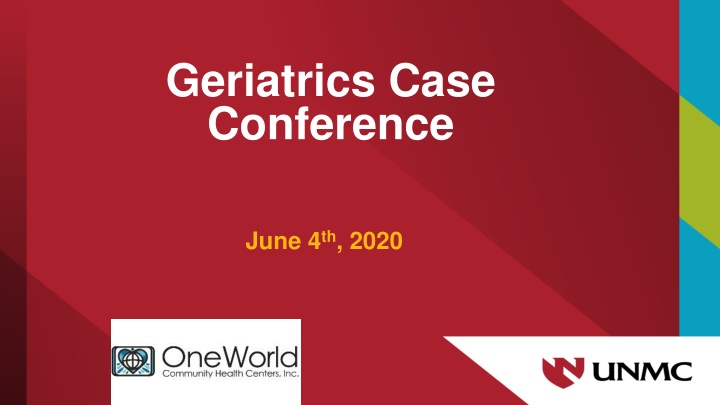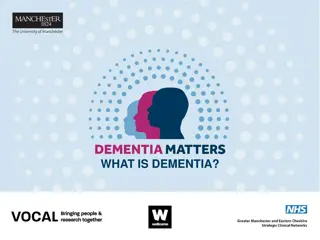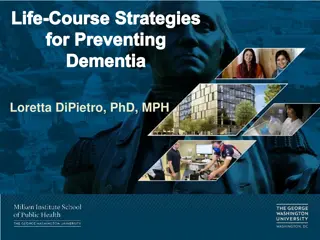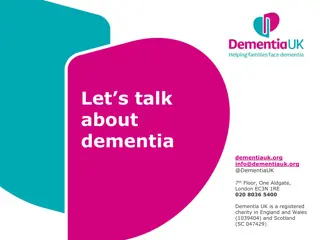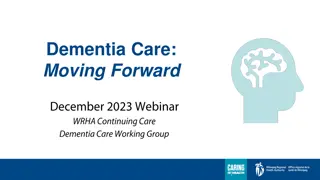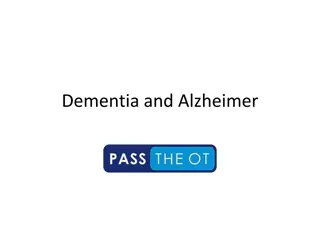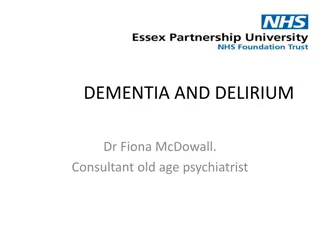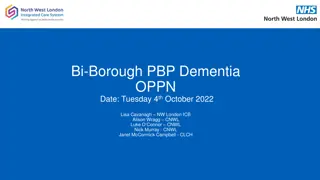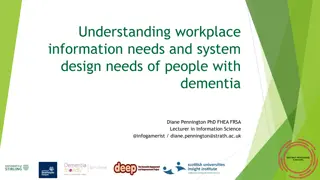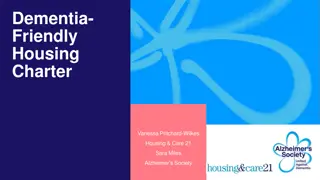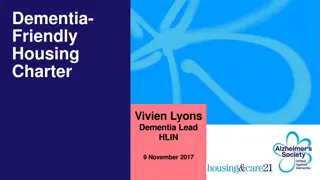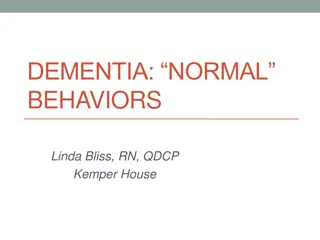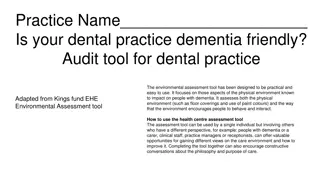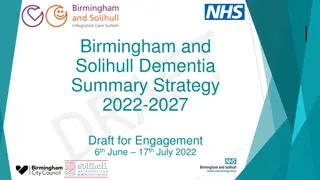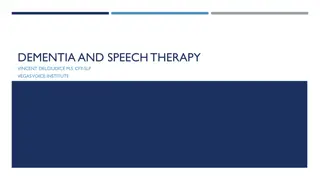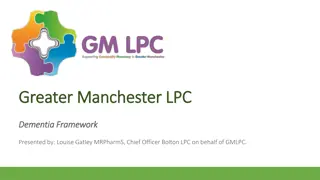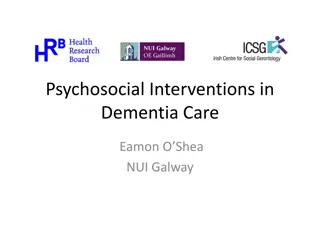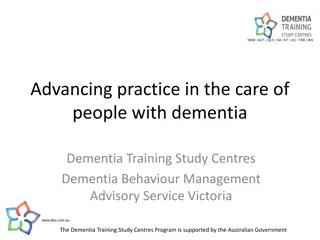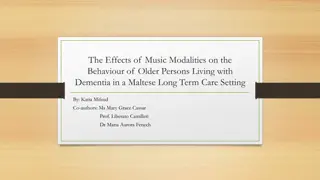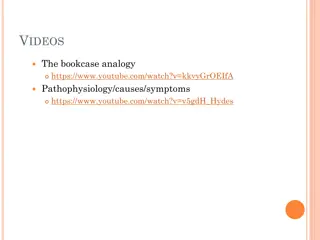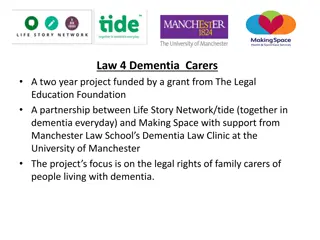Best Practices for Identifying Dementia in Non-English Speakers: Neuropsych Perspective
This program delves into the specialized considerations and cognitive screening tests for diagnosing dementia in non-English speaking patients, highlighting the importance of understanding baseline functioning, cognitive risk factors, and the impact of education, SES disparities, and psychological status. It emphasizes the need for tailored approaches in cognitive screening and underscores the complexity of diagnosing dementia in diverse populations.
Download Presentation

Please find below an Image/Link to download the presentation.
The content on the website is provided AS IS for your information and personal use only. It may not be sold, licensed, or shared on other websites without obtaining consent from the author.If you encounter any issues during the download, it is possible that the publisher has removed the file from their server.
You are allowed to download the files provided on this website for personal or commercial use, subject to the condition that they are used lawfully. All files are the property of their respective owners.
The content on the website is provided AS IS for your information and personal use only. It may not be sold, licensed, or shared on other websites without obtaining consent from the author.
E N D
Presentation Transcript
Geriatrics Case Conference June 4th, 2020
BEST PRACTICES FOR IDENTIFYING DEMENTIA IN NON-ENGLISH SPEAKERS (From a Neuropsych Perspective) Amelia (Aimi) Nelson, Ph.D., ABPP-CN Program Director, Clinical Neuropsychology Fellowship Neuropsychology Division Chief Assistant Professor Department of Neurological Sciences
This program is supported by the Health Resources and Services Administration (HRSA) of the U.S. Department of Health and Human Services (HHS) as part of an award totaling 749,926.00 with 0% financed with non-governmental sources. The contents are those of the author(s) and do not necessarily represent the official views of, nor an endorsement, by HRSA, HHS, or the U.S. Government. For more information, please visit HRSA.gov.
Overview General considerations for diagnosing dementia and for cognitive screening Specific considerations for non-English speaking patients Specific screening tests to consider
General Considerations for Diagnosing Dementia in Non-English Speakers Same considerations as for English-speaking patients (i.e., Dr. Koll s 2019 presentation) Routine medical history and physical exam are insufficient Cognitive testing can be useful but must be considered in the context of history and collateral info
Special Considerations for Diagnosing Dementia in Non-English Speakers Baseline functioning and cognitive risk factors Special considerations (particularly for immigrants) 1,2 Education (years completed, but also quality and focus of education, literacy, parental education, etc.) SES & health disparities (poverty, economic opportunity, occupational risks, exposure to westernized practices) Psychological status (general psychological status but also trauma: migration, war, separation from family, etc.; acculturation) 1Strutt & Puente, 2017 2Fujii, 2017
Cognitive Screening Considerations for Non- English Speakers Same considerations as with English-speaking patients... Consider the clinical situation and context (i.e., Dr. Koll s 2019 presentation) Short tests are convenient, while longer tests/batteries may be more reliable Resources (time, staffing) Expertise availability One Size Does Not Fit All Consider the specific reason for the testing Consider patient characteristics: Sensory or motor limitations Demographics (e.g., age, education, ethnicity, occupation)
Cognitive Screening Considerations for Non- English Speakers No test is free of cultural and educational influences Using tests that are primarily non-verbal is not necessarily adequate Validity considerations: Has the cognitive screener been validated in the specific language and culture? Translation validation; Same language doesn t necessarily mean same culture In addition, is the screen influenced by education? (e.g., MMSE, GPCOG) Has the screener been validated for use by phone or at-home video-based administration? Cut score vs. normative comparison Is a professional interpreter available?
Cognitive Screening Considerations for Non- English Speakers Interpreter considerations: Avoid interpretation by family members Allow ample time Determine interpreter availability (in person or by phone only) Keep in mind that interpretation is inherently subjective Train and prepare the interpreter Decide on simultaneous vs. consecutive interpretation Establish rapport Recruit interpreter s assistance with scoring, if needed
What If Cognitive Screening Just Isnt Possible? There are times when a cognitive screen should not be administered: No available translated/validated measures Severe cognitive impairment or significant distress Very low education level or lack of familiarity with Westernized testing Consider instead:1 Informant questionnaires and other methods of gathering info about functioning Direct observation Charting behavioral changes over time Criterion-referenced testing Using norms of demographically-similar groups in published research 1AACN Practice Guidelines, 2007
Cognitive Screens to Consider for Non-English Speaking Patients There is no single best instrument!! There are some tests that have been widely validated Cognitive (performance-based): MoCA, RUDAS Informant Questionnaire: IQCODE
Montreal Cognitive Assessment (MoCA) Cognitive (performance-based) screen Orientation, learning and memory, attention, language, visuospatial, and executive skills Validated for ages 55 to 85 Available in nearly 100 languages Administration: 10-15 minutes Free (for now) Paper and electronic versions Alternate forms; Memory Impairment Score (version 8) Other versions (MoCA-blind, MoCA-basic, etc.) Scoring: Established cut scores for MCI and dementia
MoCA Validated in the following languages and countries: Arabic Chinese Croatian Czech Dutch Ecuador Filipino French (Canadian) Georgian German Greek Hebrew Hiligaynon Hindi Hong Kong Italian Japanese Korean Malay Malayalam Persian Polish Portuguese Russian Sinhalese Spanish Swahili Swedish Taiwanese Tamil Thai Turkish https://www.mocatest.org/reference/
MoCA Strengths: Multiple cognitive domains ( cortical and subcortical functions) Good to great psychometrics (reliability and validity) International validation and translations Alternate forms (repeat administration); Different versions (e.g., blind) Weaknesses: Length of time for administration Controversy over cut point May be too difficult for significantly cognitively impaired Education bias for lower education (English version) Mandatory training
Rowland Universal Dementia Assessment Scale (RUDAS) Cognitive (performance-based) screen Assesses memory, visuospatial orientation, praxis, visuconstruction (drawing), and language Roo-Dash! Interpreted during the assessment Some written translations available but not validated Many studies show no significant cultural or educational bias (Look carefully at research) (Look carefully at the items) (Less affected by language and education than MMSE) (Some studies have shown an education bias in some cultures)
RUDAS Psychometrics: Reasonable Administration & scoring: 10 minutes to administer Total score out of 30 22 = possible cognitive impairment Helpful links: Initial publication (Storey et al., 2004): https://pubmed.ncbi.nlm.nih.gov/15190994/ Administration & scoring guidelines and video, English form, and translations into Chinese and Italian: https://www.dementia.org.au/resources/rowland-universal-dementia- assessment-scale-rudas Validation report: https://www.dementia.org.au/sites/default/files/20110303-Nat-CALD- RUDASvalidation2007.pdf *Lit search will reveal validation in other countries (e.g., Peru, Thailand)
Informant Questionnaire on Cognitive Decline in the Elderly (IQCODE) Informant questionnaire of cognition and functional abilities 26 questions assessing magnitude of change over the previous 10 years Two cognitive domains ( memory acquisition and retrieval; verbal and performance intelligence ) Validated in dozens of languages/countries Short and long forms
IQCODE Psychometrics: Good reliability and validity Administration: 10-25 minutes (long vs. short form) Could be administered by phone, mail, digitally Scoring: Add ratings, divide by #items, total score = 1-5 Absolute Cutoffs: 3.3 3.6 in community samples 3.4 4.0 in patient samples (Always consider the best cutoff by looking at studies that have target populations most similar to your specific patient)
IQCODE Validated in: China Netherlands France Canada-French Germany Italy Guam Japan Korea Lithuania Norway Iran Poland Brazil Spain Thailand Turkey Helpful links: English and translated versions available at: https://rsph.anu.edu.au/research/tools- resources/informant-questionnaire-cognitive-decline-elderly IQCODE validation study (Jorm, 1994): https://pubmed.ncbi.nlm.nih.gov/8208879/ IQCODE review (Jorm, 2004): https://rsph.anu.edu.au/files/IQCODE_review.pdf
IQCODE Strengths: International validation and translations Functional assessment, thus not impacted by education or language proficiency Can be administered to informants for patients who cannot undergo cognitive testin Incremental validity when used with other performance-based measures Weaknesses: Requires an informant Informant s mood/relationship can impact scores Doesn t measure stages of dementia or help with differential diagnosis of underlying cause of dementia
Take Home Points Preparation is key for diagnosing dementia in non-English speaking patients! Get to know your patient and their sociocultural background Select test(s) that have been validated in individuals most similar to your patient Conduct a lit search Decide whether cognitive screening is even indicated Prepare the interpreter Involve a collateral informant, when possible, for history Include all possible data that you can gather for your diagnosis
Take Home Points Consider how culture, language, and/or education may impact performance Consider other factors that can impact cognitive performance Nutritional deficiencies, metabolic issues, etc. Mood Fatigue Motivation, effort Rapport Always, always state any limitations Consult when possible Refer for further assessment, if and when possible UNMC/NE Med Neuropsychology (Spanish): 402-552-6094 Conrado Rodriguez, Ph.D. (bilingual psychologist, Omaha)
